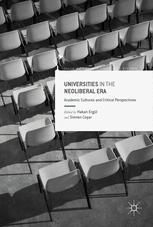

Most ebook files are in PDF format, so you can easily read them using various software such as Foxit Reader or directly on the Google Chrome browser.
Some ebook files are released by publishers in other formats such as .awz, .mobi, .epub, .fb2, etc. You may need to install specific software to read these formats on mobile/PC, such as Calibre.
Please read the tutorial at this link: https://ebookbell.com/faq
We offer FREE conversion to the popular formats you request; however, this may take some time. Therefore, right after payment, please email us, and we will try to provide the service as quickly as possible.
For some exceptional file formats or broken links (if any), please refrain from opening any disputes. Instead, email us first, and we will try to assist within a maximum of 6 hours.
EbookBell Team

0.0
0 reviewsThis book explores the question of how and to what extent the ongoing neoliberal transformation of higher education exerts influence on the university and academic everyday life in different societies. By listening to, observing, and comparing the critical voices of academics and students – the voices that matter – the book reviews first hand experiences from different societies and university cultures located within the European and semi-Mediterranean landscape, including the Czech Republic, Morocco, Turkey, and United Kingdom.
By bringing together original fieldworks combining the structural analysis of the neoliberal shift with the academic individual’s repositioning, struggle and response, the book documents a number of similarities and differences experienced in different academic cultures. The chapters present a rich variety of subjects, including academic labor, academic identity and knowledge production, (un)employment, (in)equality, academic feminism, oppression and resistance from ethnographic, political and sociological perspectives. This timely and insightful volume will appeal to researchers, academics, students and advocates of academic freedom from different disciplines and academic cultures whose agendas prioritize higher education policies, university systems, academic production and academic labor.